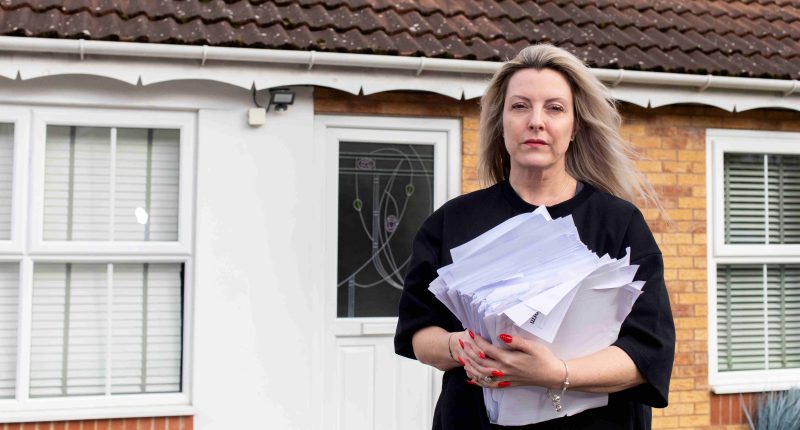A MUM-OF-FOUR has had to pay more than £91,000 extra on her mortgage since the collapse of Northern Rock.
Mortgage prisoner Rebecca Wendel, a self-employed hairdresser, describes how she’s trapped paying 9.79% interest on her home loan.
It means her mortgage bill sits at a whopping £2,150 a month – up from £1,049 in August 2022 when she was paying an above market rate of 6.75%.
Rebecca has paid over the odds for her mortgage since 2008 when Northern Rock, which held her mortgage, went bust and her loan was sold to Heliodor Mortgages, part of Topaz Finance.
She is among more than 200,000 homeowners who had their mortgages sold to finance companies, which have continued to charge above-market rates for the loans.
These people have become known as mortgage prisoners because stricter lending restrictions mean they cannot pass affordability checks, which would allow them to access lower interest rates.
Read more in money
Rebecca said: “It makes me feel angry that I’ve paid so much extra money.
“My kids haven’t had a childhood – they haven’t been able to do things with their mother that they would normally do.”
Rebecca, 42, from Leeds
However, law firm Harcus Parker, which represents more than 10,000 mortgage prisoners, has secured its first trial at the High Court against TSB to determine whether the bank financially exploited its Whistletree mortgage prisoner customers.
The law firm, which is running a no-win, no-fee group litigation claim, believes that if the trial is successful, it could set a precedent for all mortgage prisoners, giving fresh hope to homeowners, including Rebecca.
What is a mortgage prisoner?
A MORTGAGE prisoner is a borrower who is trapped on an expensive mortgage deal and unable to switch to a cheaper one because they don’t pass affordability tests
An affordability test assesses whether a borrower can afford monthly payments on a mortgage or re-mortgage and whether they should be offered a loan.
Most mortgage prisoners have a mortgage in a closed book of an inactive firm.
This means that the mortgage is held with a lender that can no longer make mortgage contracts because they are not authorised to do so.
Many of these closed books were created when firms collapsed in or soon after the financial crisis of 2008.
UK Asset Resolution (UKAR) took control of the mortgage books concerned and later sold them off.
At the same time, regulators and lenders imposed more stringent borrowing criteria to help prevent another financial crash.
Many people were unable to meet the new conditions.
They could not move to other deals, even if they would pay less by doing so.
Rebecca and her now ex-husband took out a mortgage of £284,000 with Northern Rock in 2007.
Most read in Money
But she still owes the full amount 17 years later, having been talked into switching to an interest-only deal nine months after the bank collapsed.
Their loan was sold to Heliodor Mortgages, but Rebecca has been unable to switch to a more favourable mortgage deal since then because of stricter lending criteria.
She has been struggling to pay the mortgage on her own since 2016, and says the constant interest rate rises since December 2021 have left her at breaking point.
“It’s a constant, daily battle to get up and get on with the day, knowing that at the end of it, there’s nothing to show for it other than being able to maintain the roof over my head,’ she said.
“I’m taking it a month at a time now because it’s killing me. I’m working all the time, it’s just ridiculous.
“I’ve got no home life whatsoever, and we don’t do the things that other families do because I’m not at home.”
Harcus Parker hopes its latest claim against TSB and its subsidiary Whistletree will help mortgage prisoners at other firms reclaim the difference between the high interest they have paid on their mortgages and the interest they would have paid if their lender had set the rate at a lower “fair” level.
In response to this, Rebecca said: “If I can get the money back it would go straight off my mortgage, and enable me to access a normal mortgage.
“I’d be about £1,000 better off each month, and that’s life-changing for somebody like me.
“The money would also enable me to stay where I am.
“At the moment I’m still 50/50 about putting the house up for sale. Part of me feels that’s giving up.
“But equally, I can’t afford to keep doing what I’m doing.
Damon Parker, senior partner at Harcus Parker, said: “Tens of thousands of mortgage prisoners are still stuck on these high interest rates through no fault of their own.
‘We are very hopeful that the trial in July, this year, will finally determine that these people are victims of an appalling financial injustice and should be allowed to recover the excess money that they have paid.”
The group litigation represents both current and former mortgage prisoners.
While Harcus Parker’s first trial focuses on getting compensation for TSB’s Whistletree customers, it’s anticipated that customers at Helior, Landmark and NRAM will be impacted further down the line.
You can register your interest in the claim by visiting https://mortgageprisonersclaims.com/.
“Whistletree customers are not mortgage prisoners.”
TSB
Although, Harcus Parker claims that Whistletree customers are mortgage prisoners, TSB disagrees.
A bank spokesperson said: “Since we took over the management of these mortgages, over two-thirds of Whistletree customers have either moved to a new mortgage or closed their mortgage with Whistletree.
“We remind customers they can switch at least annually, and this is displayed prominently on the Whistletree website.”
However, Whistletree mortgages were initially managed by Northern Rock (Asset Management) (NRAM) before July 2016.
At the time, there was no product transfer capability within NRAM, which allowed customers to move to better rates.
As Harcus Parker’s claim is for current and former customers, they still argue that thousands of Whistletree customers could once have been considered mortgage prisoners.
This implies that they could still be entitled to compensation during the period in which NRAM managed the book, and when customers were denied the ability to switch providers or mortgages.
A report published last year revealed that the government had made a whopping £ 2.4billion from mortgage prisoner loans.
After the crash, the government-owned UK Asset Resolution (UKAR) took control of the mortgages and later sold them off.
READ MORE SUN STORIES
But in doing so they had to maximise profit to the taxpayer.
In 2009, the Government acknowledged that selling these mortgages to inactive lenders could severely harm consumers, but didn’t take action to prevent this.










